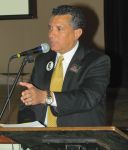In the 14 years since Pittsburgh businessman Jonny Gammage was killed by police officers during a routine traffic stop, members of the Black and White Reunion have been a leading voice in the call for better police accountability. This theme carried on into this year’s 13th Annual Summit Against Racism as community organizer and participants carried on their struggle.
 |
| FOUNDER—Tim Stevens welcomes participants with an introduction to the summit’s schedule. (Photo by J.L. Martello)
|
“What we attempt to do every year is to have people leave with a renewed commitment and to do something, anything, no matter what it is,” said Tim Stevens, founder of the Black and White Reunion. “If we can accomplish that every year, we consider this a success.”
The mission of the Black and White Reunion is to bring together organizations and individuals to eliminate racism and promote human equality. At last year’s summit this mission found relevance in the case of Jordan Miles, the former CAPA High School student beaten by three police officers.
As a continuation of last year’s summit, the workshop “Justice for Jordan” continued to push for police accountability, despite a backlash from the Fraternal Order of Police and government officials who have not taken action to discipline the three police officers. Members of the Justice for Jordan Miles Campaign are working to ensure greater public access to police disciplinary information and data associated with police activities.
“We’d love to see whether we can use the data we collect for reform or whether we can use it to file another lawsuit,” said Ngani Ndimbie, an organizer with the ACLU.
Another highlight of the Jan. 22 summit at East Liberty Presbyterian Church was a viewing of the documentary “What Does Trouble Mean?” about legendary labor organizer Nate Smith. Following in his footsteps, organizers with the Regional Equity Monitoring Project educated participants on how they could fight to create employment opportunities for minorities.
“This is something that goes way back and this is something we can do in Pittsburgh,” said Pat Clark, a consultant with REMP. “These are good jobs that we have in our city.”
Members of the Human Rights Coalition and those fighting personal human rights battles took part in the “Justice for Terrell” workshop. After 16 years of incarceration Terrell Johnson is fighting against what he claims was a wrongful murder conviction. His new trial is Feb. 7.
“We’re asking for courthouse support in this case because there’s strength in numbers,” said Sandra Cole, Johnson’s wife. “This could happen to anyone and it happened to us.”
Another workshop focused on City League sports in the Pittsburgh Public School District and a possible restructuring to merge PPS with WPIAL. Most participants did not represent either side of the argument, but said they would like to see more equality in athletic resources.
“Most of us are undecided about city sports and how we should combine with WPIAL sports,” said Mark Rauterkaus, workshop facilitator. “By and large this has been a process that is being decided by (PPS administrators.)”
While the majority of African-Americans in Pittsburgh have not and will not lose transit service due to service cuts by the Pittsburgh Port Authority, a workshop facilitated by Pittsburghers for Public Transit explained how the cuts would impact Pittsburghers as a whole, including commuters. However one fact listed by facilitators explaining that riders using the Brown Line trolley would now have to commute Downtown, was not entirely factual as this route is matched almost identically by the 43 Bailey bus route.